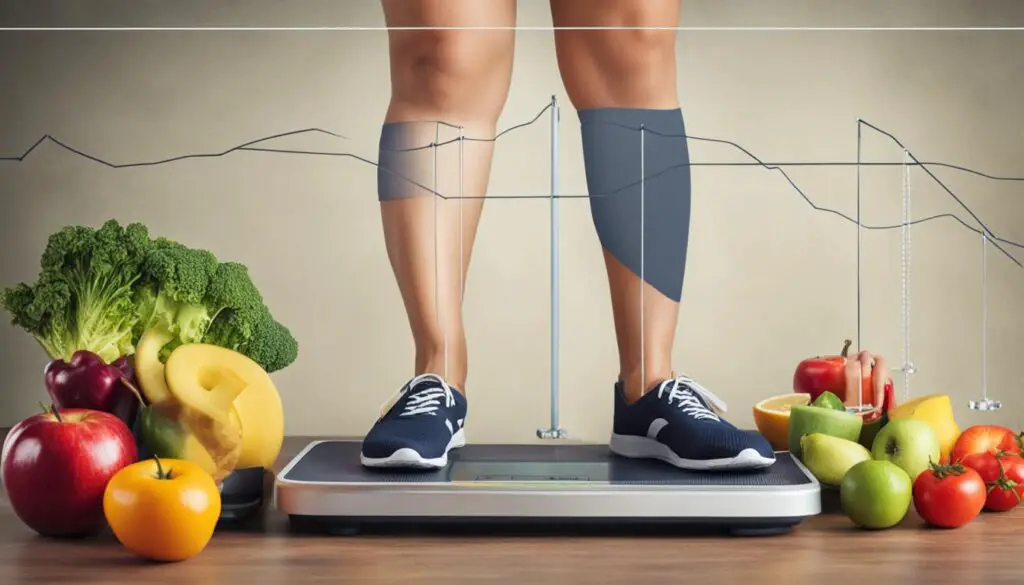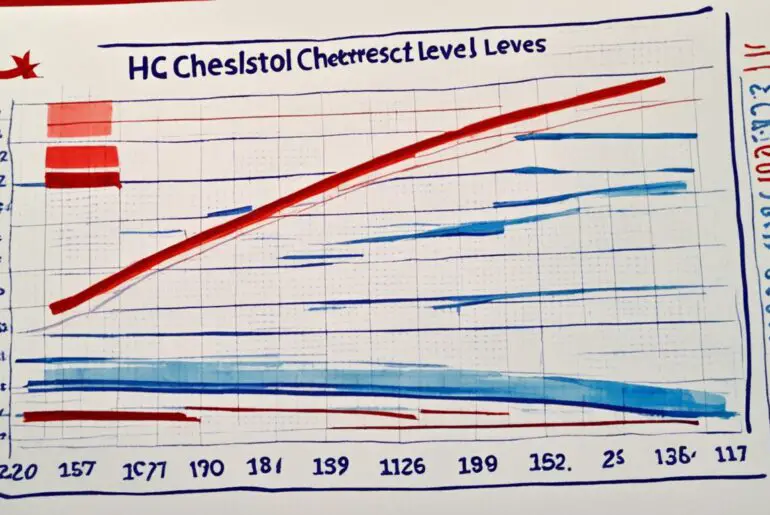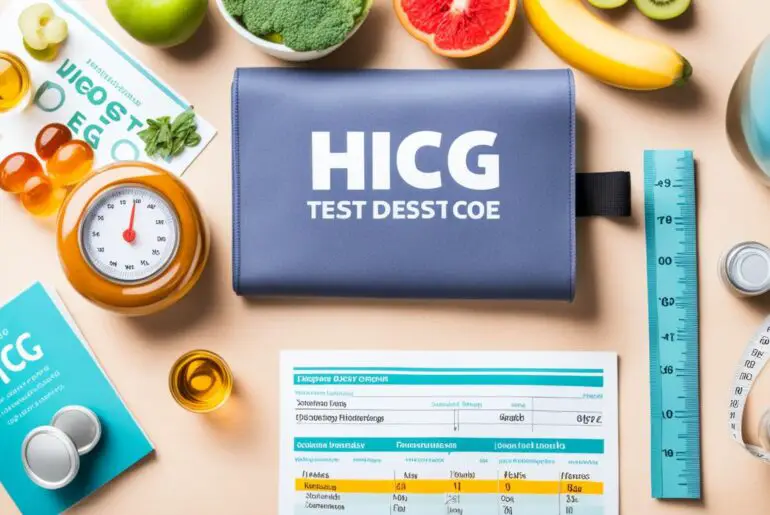When it comes to weight loss, people are willing to try just about anything. But what if the very method you’re relying on to shed those pounds could have lasting effects on your health? That’s the question we’re tackling today: Are HCG diet side effects permanent?
The HCG diet, which combines severe calorie restriction with the use of human chorionic gonadotropin (HCG) supplements, has gained popularity in recent years. Proponents claim that HCG helps suppress hunger and promotes fat burning, leading to rapid weight loss. But are the potential risks and side effects worth the temporary results?
Join me as we explore the truth behind the HCG diet side effects, their duration, and whether they can have long-term consequences. Let’s dig deep into the research and uncover the truth about the safety of the HCG diet.
Key Takeaways
- The HCG diet involves severe calorie restriction and the use of HCG supplements, but it is not considered safe or effective for weight loss.
- Potential side effects of the HCG diet include fatigue, irritability, restlessness, depression, fluid buildup, swelling of the breasts in males, and an increased risk of blood clots.
- While most side effects are temporary and subside once the diet is discontinued, there is a risk that some side effects, such as gynecomastia, may persist.
- It is recommended to explore safer methods of weight loss, such as a balanced diet and regular exercise, rather than relying on the HCG diet.
- Consulting with a healthcare provider is essential before starting any drastic weight loss methods to ensure safety and effectiveness.
Understanding the HCG Diet
The HCG diet is a weight loss method that combines severe calorie restriction with the use of HCG supplements. HCG, which stands for human chorionic gonadotropin, is a hormone produced during pregnancy. The diet typically involves consuming only 500 to 800 calories per day, which is significantly lower than the recommended daily intake for most individuals.
The theory behind the HCG diet is that the hormone will help suppress hunger and promote fat burning. However, there is no scientific evidence to support these claims, and the FDA has declared over-the-counter HCG products illegal and ineffective for weight loss.
Despite these warnings, some individuals still choose to follow the HCG diet. It is important to understand the potential risks and limitations of this approach before considering it as a weight loss option.
How Does the HCG Diet Work?
The HCG diet involves two main components: severe calorie restriction and the use of HCG supplements. Followers of the diet typically consume only 500 to 800 calories per day, which is significantly lower than the recommended daily intake for most individuals.
The idea behind the calorie restriction is to force the body to burn stored fat for energy, resulting in rapid weight loss. The HCG supplements, whether taken as injections, drops, or pellets, are believed to help maintain muscle mass and suppress appetite.
Proponents of the HCG diet claim that the hormone can reset the metabolism and promote fat burning. However, there is no scientific evidence to support these claims. The FDA has declared over-the-counter HCG products illegal and ineffective for weight loss, and studies have found that any weight loss experienced on the HCG diet is primarily due to the severe calorie restriction and not the hormone itself.
HCG Diet Overview
The HCG diet is a highly restrictive eating plan that typically involves three phases:
- Phase 1: Loading phase – During this phase, known as the “loading” phase, individuals are encouraged to eat high-calorie and high-fat foods to build up fat stores in the body.
- Phase 2: Weight loss phase – This is the most challenging phase of the HCG diet. Individuals consume a very low-calorie diet, usually ranging from 500 to 800 calories per day, while continuing to take HCG supplements.
- Phase 3: Stabilization phase – After the weight loss phase, individuals gradually increase their calorie intake and stop taking HCG supplements. This phase is designed to help stabilize weight and transition to a more sustainable eating plan.
It is important to note that the HCG diet should only be followed under the supervision of a healthcare professional, as severe calorie restriction can have serious health consequences.
HCG Diet Calorie Restriction
One of the key elements of the HCG diet is the severe calorie restriction. During the weight loss phase, individuals typically consume only 500 to 800 calories per day, which is significantly lower than the recommended daily intake for most individuals. This extreme calorie deficit can lead to rapid weight loss in the short term.
However, it is important to recognize that such severe calorie restriction is not sustainable or healthy in the long term. Eating too few calories can result in muscle loss, nutrient deficiencies, and a slower metabolism. Additionally, the body may respond to the calorie deficit by conserving energy and slowing down weight loss.
While some individuals may experience rapid weight loss on the HCG diet, it is primarily due to the calorie restriction rather than the hormone itself. It is important to prioritize overall health and well-being by choosing more sustainable and balanced approaches to weight loss.
FDA Warning and Safety Concerns

The FDA has issued a warning regarding the HCG diet and wants to educate consumers about the potential dangers and safety concerns associated with it. It is crucial to be aware of the FDA’s stance and take it into consideration before starting the HCG diet.
Over-the-counter HCG weight-loss products have been declared illegal by the FDA and are not proven to be effective for weight loss. Despite their availability, these products should be avoided due to their unregulated nature and potential risks.
Studies suggest a possible link between HCG weight-loss products and an increased risk of certain types of cancer. HCG may stimulate the growth of androgen cells, which can potentially lead to cancer. This concerning finding underscores the importance of prioritizing safety and consulting with a healthcare provider before considering the HCG diet.
In addition to the potential cancer risk, severe calorie restriction is a key aspect of the HCG diet. This extreme restriction can have various negative effects on the body. It may lead to the formation of gallstones, electrolyte imbalances, and an increased risk of blood clots.
By prioritizing safety and consulting with a healthcare provider, individuals can make informed decisions about their weight loss journey. It is important to explore safer alternatives and consider methods that do not carry potential risks like the HCG diet. A healthcare provider can provide personalized recommendations tailored to individual needs and help create a safe and effective weight loss plan.
“It is crucial to prioritize safety and consult with a healthcare provider before considering any drastic weight loss methods, such as the HCG diet.”
| Concerns | Potential Risks |
|---|---|
| Possible link to cancer | An increased risk of certain types of cancer due to stimulation of androgen cells |
| Severe calorie restriction | Gallstone formation, electrolyte imbalances, increased risk of blood clots |
Side Effects of the HCG Diet
When it comes to the HCG diet, it’s essential to be aware of the potential side effects that may arise from this weight loss method. These side effects can vary from short-term discomfort to potentially long-term health risks. It’s crucial to understand what you may be signing up for before embarking on the HCG diet.
Common Side Effects
Individuals who have tried the HCG diet have reported experiencing several common side effects. These side effects include:
-
Fatigue: Many people on the HCG diet report feeling tired and lacking energy.
-
Irritability: The severe calorie restriction and hormonal changes associated with the HCG diet can cause irritability and mood swings.
-
Restlessness: Some individuals may feel restless or have difficulty sleeping while on the HCG diet.
-
Depression: The combination of low-calorie intake and hormone changes can contribute to feelings of sadness or depression.
-
Fluid retention (edema): Due to the restricted intake of calories, some people may experience fluid retention, which can cause swelling in various parts of the body.
-
Swelling of the breasts in males (gynecomastia): One of the potential side effects of the HCG diet is the enlargement of breast tissue in males.
These common side effects are likely a result of the severe calorie restriction and the hormonal changes caused by the HCG supplements. It’s important to keep in mind that everyone’s body reacts differently, and individual experiences may vary.
Potential Risks
In addition to the common side effects, there is also a potential risk associated with the HCG diet. One such risk is an increased chance of developing blood clots, known as thromboembolism. This risk may be due to the hormonal changes and the potential effects on blood coagulation. While the risk is relatively low, it’s important to be aware of this potential complication.
It’s crucial to consider these potential risks and side effects before starting the HCG diet. Consulting with a healthcare provider is highly recommended to ensure you fully understand the potential implications and discuss alternative weight loss strategies that may be more appropriate for your needs.
Durability of HCG Diet Side Effects

The duration and long-term effects of HCG diet side effects can vary depending on the individual and their body’s response. In most cases, the side effects of the HCG diet are temporary and subside once the diet is discontinued. However, there is a risk that certain side effects, such as gynecomastia (swelling of the breasts in males), may persist even after the diet is discontinued.
It is important to note that the long-term effects of the HCG diet have not been extensively studied, and more research is needed to fully understand the potential risks and consequences.
| Side Effect | Durability |
|---|---|
| Gynecomastia (swelling of the breasts in males) | Potentially permanent |
| Other common side effects (fatigue, irritability, restlessness, etc.) | Temporary (subside after discontinuing the diet) |
Health Risks and Considerations
The HCG diet carries significant health risks and requires careful considerations before embarking on this weight loss method. Severe calorie restriction, a hallmark of the HCG diet, can lead to various health complications. Here are some important health risks and considerations to keep in mind:
1. Increased Risk of Gallstones
Due to the extreme calorie restriction on the HCG diet, the reduced fat intake can cause bile to become concentrated, increasing the risk of developing gallstones. Gallstones can lead to severe abdominal pain, nausea, and other digestive issues.
2. Electrolyte Imbalance
The HCG diet restricts the intake of essential nutrients and minerals, which can lead to electrolyte imbalances in the body. This imbalance can result in symptoms such as muscle cramps, weakness, irregular heartbeat, and even fainting.
3. Potential Vitamin and Mineral Deficiencies
With the severe calorie restriction and limited food choices on the HCG diet, it can be challenging to meet the body’s nutritional needs. This can lead to deficiencies in essential vitamins and minerals like vitamin B12, iron, and calcium, which are crucial for overall health.
4. Hormonal Imbalances
The use of HCG supplements on the diet can disrupt the body’s natural hormone balance. This may lead to hormonal imbalances, which can have long-term effects on various bodily functions and may even impact fertility in both men and women.
5. Potential Psychological Effects
The extreme calorie restriction and hormonal changes associated with the HCG diet may have psychological effects on some individuals. This can include feelings of fatigue, irritability, mood swings, and an increased risk of developing eating disorders or disordered eating patterns.
Consultation with a Healthcare Provider
Before starting the HCG diet or any other drastic weight loss program, it is crucial to consult with a healthcare provider. They can evaluate your overall health, consider any pre-existing medical conditions, and provide personalized advice on the safety and effectiveness of the HCG diet for your specific circumstances.
A healthcare provider can also explore alternative weight loss methods that prioritize your well-being and reduce potential health risks. They can help you develop a balanced and sustainable weight loss plan that incorporates healthy eating habits, regular exercise, and long-term lifestyle changes.
| Health Risks | Considerations |
|---|---|
| Increased risk of gallstones | Consult with a healthcare provider |
| Electrolyte imbalance | Evaluate overall health conditions |
| Potential vitamin and mineral deficiencies | Assess pre-existing medical conditions |
| Hormonal imbalances | Explore alternative weight loss methods |
| Potential psychological effects | Develop a balanced and sustainable weight loss plan |
It is important to prioritize your health and well-being when considering a weight loss program. The HCG diet may offer rapid weight loss, but the potential health risks and long-term effects should not be overlooked. Consulting with a healthcare professional can provide valuable guidance and support on your weight loss journey.
Safer Alternatives for Weight Loss

When it comes to achieving weight loss, there are safer alternatives to the HCG diet. Instead of resorting to extreme measures, such as severe calorie restriction and the use of HCG supplements, it is important to prioritize overall health and well-being. By incorporating a balanced diet and regular exercise into your lifestyle, you can achieve sustainable and long-term weight loss.
A balanced diet is essential for providing your body with the necessary nutrients it needs to function optimally. It should include a variety of foods from all food groups, including fruits, vegetables, whole grains, lean proteins, and healthy fats. This balanced approach ensures that you are nourishing your body while creating a calorie deficit for weight loss.
Regular exercise is another crucial component of a healthy weight loss plan. Engaging in physical activity helps to burn calories, build lean muscle mass, and increase your overall fitness level. Aim for at least 150 minutes of moderate-intensity aerobic exercise or 75 minutes of vigorous-intensity aerobic exercise every week, along with strength training exercises at least twice a week.
By combining a balanced diet with regular exercise, you can achieve sustainable weight loss without subjecting your body to the potential risks and side effects associated with the HCG diet. This approach allows you to focus on overall health and well-being, rather than solely on rapid weight loss. Remember, weight loss is a journey, and it is important to adopt healthy habits that can be maintained in the long run.
Benefits of Safer Weight Loss Methods:
- Avoids potential side effects of the HCG diet
- Promotes overall health and well-being
- Provides a sustainable approach to weight loss
- Nourishes the body with essential nutrients
- Reduces the risk of nutrient deficiencies
- Supports long-term weight management
Remember, before starting any weight loss journey, it is important to consult with a healthcare provider. They can assess your individual needs, evaluate any pre-existing health conditions or medications, and provide personalized recommendations for safe and effective weight loss. Seeking professional advice ensures that you are taking the right steps towards achieving your weight loss goals while prioritizing your health and well-being.
| Unsafe HCG Diet | Safer Alternatives |
|---|---|
| Severe calorie restriction | Calorie deficit through balanced diet and exercise |
| Risky hormonal supplements | Natural and sustainable weight loss methods |
| Unproven effectiveness | Supported by scientific research and evidence |
| Potential side effects and health risks | Promotes overall health and well-being |
Consulting with a Healthcare Provider

Before embarking on any weight loss journey, it is crucial to consult with a healthcare provider. Seeking professional advice for weight loss can provide you with personalized recommendations tailored to your individual needs and health conditions. A healthcare provider can assess your current health status, evaluate any medications you may be taking, and guide you toward safe and effective weight loss strategies.
By consulting with a healthcare provider, you can gain valuable insights into the most suitable weight loss approach for your specific circumstances. They can help you navigate through any potential challenges, effectively manage underlying health conditions, and support you in creating a sustainable weight loss plan that focuses on long-term health outcomes.
When discussing your weight loss goals with a healthcare provider, be sure to provide them with comprehensive information about your medical history, current medications, and any other factors that may impact your weight loss journey. Transparency and open communication are key to receiving accurate, personalized guidance.
“Consulting with a healthcare provider is an essential step in ensuring the safety and effectiveness of your weight loss efforts. They have the knowledge and expertise to guide you on a path that aligns with your overall health goals.”
Remember, seeking professional advice for weight loss is not only about addressing immediate goals but also about prioritizing your long-term well-being. A healthcare provider can support you in making informed decisions, monitor your progress, and make necessary adjustments to ensure optimal results.
Importance of Balanced Nutrition

In addition to creating a calorie deficit through balanced nutrition, it is crucial to meet your body’s nutritional needs while on a weight loss journey. A balanced diet plays a vital role in achieving sustainable weight loss and maintaining overall health and well-being.
Achieving balanced nutrition involves incorporating a variety of nutrient-rich foods into your diet, including fruits, vegetables, whole grains, lean proteins, and healthy fats. These food groups provide essential vitamins, minerals, and antioxidants that support the body’s optimal functioning.
Fruits and vegetables are rich sources of vitamins, minerals, and dietary fiber. They help promote satiety, support digestion, and provide crucial nutrients for cellular processes in the body. Whole grains, such as brown rice and whole wheat bread, are packed with fiber and essential nutrients that aid in digestion and help maintain stable blood sugar levels.
Lean proteins, including poultry, fish, tofu, and legumes, provide essential amino acids for building and repairing tissues. They also promote satiety, making you feel fuller for longer and reducing the urge to overeat. Healthy fats, such as avocados, nuts, and olive oil, are necessary for absorbing fat-soluble vitamins and providing sustained energy.
By focusing on balanced nutrition, you can ensure that your body receives the necessary nutrients while reducing excess calorie intake. This approach supports both weight loss and overall wellness.
“A balanced diet is essential for achieving sustainable weight loss and overall well-being.”
Incorporating a variety of nutrient-rich foods into your diet is key to meeting your nutritional needs during weight loss. It is essential to consult with a healthcare provider or registered dietitian to develop a personalized meal plan that suits your individual needs and goals.
Long-Term Approach to Weight Management

Weight management is a lifelong journey that requires a comprehensive and sustainable approach. Rather than focusing on quick fixes or extreme weight loss methods, it is essential to adopt healthy habits that can be maintained in the long run. By prioritizing overall wellness and making gradual, sustainable changes, individuals can effectively maintain their weight loss and reduce the risk of weight regain.
One key aspect of a long-term approach to weight management is establishing a balanced diet. This involves consuming a variety of nutrient-rich foods, including fruits, vegetables, whole grains, lean proteins, and healthy fats. A balanced diet provides the necessary vitamins, minerals, and antioxidants that support overall health and well-being.
In addition to a balanced diet, regular physical activity plays a crucial role in maintaining weight loss. Engaging in physical activities that you enjoy not only helps burn calories but also improves cardiovascular health, builds strength, and boosts mood. Aim for at least 150 minutes of moderate-intensity aerobic exercise or 75 minutes of vigorous-intensity aerobic exercise per week, along with muscle-strengthening activities at least twice a week.
Remember that every individual is unique, and finding the right balance of diet and exercise that works for you may require some trial and error. Consulting with a healthcare provider or a registered dietitian can provide valuable guidance and ensure that your weight management plan is tailored to your specific needs and preferences.
In addition to focusing on nutrition and physical activity, effective weight management also involves stress management and positive lifestyle choices. Chronic stress can contribute to weight gain and hinder weight loss efforts. Developing healthy coping mechanisms, such as mindfulness meditation, deep breathing exercises, or engaging in hobbies, can help manage stress levels and prevent emotional eating.
Furthermore, it is important to approach weight management with a positive mindset. Embrace self-compassion and celebrate small victories along the way. Remember that sustainable weight loss is a gradual process, and maintaining a healthy weight requires consistency and commitment.
To summarize, a long-term approach to weight management involves adopting sustainable habits, including a balanced diet, regular physical activity, stress management, and positive lifestyle choices. Rather than pursuing quick fixes or extreme methods, prioritize overall health and well-being to achieve lasting results.
Conclusion
The HCG diet is not recommended as a safe or effective method for weight loss. Severe calorie restriction and the use of HCG supplements can result in various risks and potential side effects. These may include fatigue, irritability, depression, edema, and an increased risk of blood clots. It is important to note that the long-term effects of the HCG diet have not been well-studied, and certain side effects, such as gynecomastia, may persist even after discontinuing the diet.
To prioritize your health and well-being, it is advisable to choose safer alternatives for weight loss. A balanced diet that includes a variety of nutritious foods and regular exercise is key to achieving sustainable and long-term weight loss. Consulting with a healthcare provider is essential to ensure the safety and effectiveness of any weight loss plan. They can provide personalized recommendations and help you create a tailored weight loss approach based on your individual needs and health conditions.
In conclusion, the HCG diet carries potential risks and side effects that outweigh any perceived benefits. It is crucial to prioritize overall health and well-being when considering weight loss strategies. Opt for sustainable methods, seek professional advice, and focus on balanced nutrition and regular physical activity to achieve long-term weight management goals.
FAQ
Are HCG Diet Side Effects Permanent?
No, most HCG diet side effects are temporary and subside once the diet is discontinued. However, certain side effects, such as gynecomastia (swelling of the breasts in males), may persist even after discontinuing the diet.
How Does the HCG Diet Work?
The HCG diet involves severe calorie restriction and the use of HCG supplements. The theory is that HCG will suppress hunger and promote fat burning. However, there is no scientific evidence to support these claims.
What are the Side Effects of the HCG Diet?
The side effects of the HCG diet can include fatigue, irritability, restlessness, depression, fluid retention (edema), and swelling of the breasts in males (gynecomastia). There is also a potential risk of developing blood clots while on the HCG diet.
How Long Do HCG Diet Side Effects Last?
The duration of HCG diet side effects can vary. In most cases, the side effects are temporary and subside once the diet is discontinued. However, the long-term effects of the HCG diet are not well-studied.
What are the Health Risks and Considerations of the HCG Diet?
The HCG diet carries various health risks, including an increased risk of gallstones, electrolyte imbalances, and an increased risk of blood clots. It is important to consult with a healthcare provider before starting the HCG diet, especially if you have pre-existing health conditions or are taking medications.
What are Safer Alternatives for Weight Loss?
Safer alternatives for weight loss include a balanced diet that includes a variety of nutritious foods and regular exercise. These methods are more effective and sustainable for long-term weight loss.
Should I Consult with a Healthcare Provider before Starting the HCG Diet?
Yes, it is crucial to consult with a healthcare provider before starting the HCG diet. They can assess your individual needs, evaluate any pre-existing health conditions or medications, and provide personalized recommendations for safe and effective weight loss.
What is the Importance of Balanced Nutrition in Weight Loss?
Balanced nutrition is essential for weight loss as it provides your body with the necessary nutrients it needs to function properly. A balanced diet includes a variety of fruits, vegetables, whole grains, lean proteins, and healthy fats.
How Should I Approach Weight Management in the Long Term?
Weight management should be approached with a long-term mindset. It is important to adopt sustainable and healthy habits, including a balanced diet, regular physical activity, stress management, and positive lifestyle choices.




